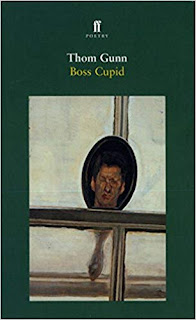Circumference, Poetic Measurement, Mark Ward
Circumference usually
relates to a part of the anatomy in gay poetry. Thankfully, Mark Ward’s
Circumference has higher aspirations. His chapbook’s title conjures Donne’s
famous image of a circle that is drawn as two souls, like the legs of a compass,
yearn for one another. What evolves from the title is a fine collection of
poems that map the boundaries of human life.
The plot of Circumference
is simple and that is one of the book’s strengths. Tommy’s father is dying and
that requires Tommy (the narrator) to return to Pepperell, a small town in
Massachusetts. Inevitably, this results in a confrontation with his mother who
has never coped with his sexual orientation, and memories of Mike, his first, traumatic love. The plot reads like the distillation of a larger work: only the bones are
left. And this works wonderfully because it allows Ward, as the author, to
concentrate on emotions: the reader is freed from narrative
demands and allowed to follow every nuance of conflict and heartache. Ward
creates the local flavour of Pepperell well, but just enough to allow the
setting to generalise. It could be any small town anywhere, a place not unlike
the many towns where young gay men have struggled to find themselves and
stretch out their hands, like Blake’s God, but in defiance of Old Nobodaddy, to
break the circle of their mental and bodily imprisonment. There is a sense in
which Circumference is a modern morality play… it speaks to the gay Everyman as
he wanders the world.
The poems are split into
two time periods, 1939-42, when Tommy is in his teens and 1959, when he has
reached the age of thirty-five. This sets Ward a novelist’s problem: he must
create Tommy at 35 and Tommy’s recreation of himself at fourteen to eighteen—
without becoming over sentimental and childish. The child-voice must exist with
the man-voice. Ward spans this problem by writing poetry that selects a variety
of fitting forms. The opening two poems illustrate this transition well.
The intermittent man in my bed decides
tonight to talk, says Pepperell, The intermittent man in my bed decides
that can’t be a real place, and whatever little we had
dies.
Stark, detached, casual,
Tommy is depicted precisely. Then the tightly controlled verse opens lyrically
as Mike is remembered:
I don't sleep the night
stretches out like
days retreat into twilight
my missing Mike
my soul to keep in line of sight
a lengthy hike
haunting me so I decide
Rhyme stratifies adult feeling, the ee in sleep/retreat/keep, the like/Mike/hike progression, the night/light/sight final rhymes, and in the midst, a childish, Christian prayer: "Now I lay me down to sleep/I pray the Lord my soul to keep.” There is sophistication, but with Tommy at 14, a simpler list, as the poem switches between experience and innocence:
I don't sleep the night
stretches out like
days retreat into twilight
my missing Mike
my soul to keep in line of sight
a lengthy hike
haunting me so I decide
Rhyme stratifies adult feeling, the ee in sleep/retreat/keep, the like/Mike/hike progression, the night/light/sight final rhymes, and in the midst, a childish, Christian prayer: "Now I lay me down to sleep/I pray the Lord my soul to keep.” There is sophistication, but with Tommy at 14, a simpler list, as the poem switches between experience and innocence:
Everyone knows what a homo is
eyes locked to similar skin...
his only interest, destroying innocence
he swaddles himself, trying [.]
Circumference is a slight book in length, but it is one that
has taken a considerable amount of crafting and leaves an impression
much deeper than its twenty-eight pages. This impact comes from the cohesion
created by Ward. A sequence is a difficult object to create, too much flow and
it melts away, poems only have meaning within a whole, too static and it is
just a collection of loose poems without relationship. The four in-the-present
poems that are titled Circumference are fluid creations whereas the in-the-past poems
are discrete pieces— some, like the heartfelt “Resisting Existence”, could be stand alone poems. The result is that of a mind in full flow
as it faces a crisis in the present and a mind that perceives the past in terms
of key, self-contained events. Such is a true reflection on how memory develops
with age. If we look back through time, to a moment of real emotion, Sterne’s
sentimental absurd, points at which time’s narrative deepens around some small
event, we can feel ourselves re-writing that event until we have a story that
makes intimate sense. There are poems in Circumference that do this sublimely,
poems such as “A School Photograph” and “Monsters in the Closet.”
Saturdays
are spent in the dark;
a
creature double feature, Mike’s hand
clasped
in mine, or trailing tickles
down
forearms. In almost darkness
heads
can find shoulders, heartbeats
slow
to satiated symmetry.
A childish event, going to the cinema, a treat, yet over it
arcs a child’s recognition of a psychological darkness and a worrying
awareness of how reality and the unreal mime one another.
In a world where size falsely matters, novels are about blockbusters and trilogies and poetry is about the volume of around seventy poems (usually stuffed
with a lot of dross that detracts from the fine poems) it is good to see a
small press back a piece of short, quality writing that is well worth reading and well worth buying.




Comments